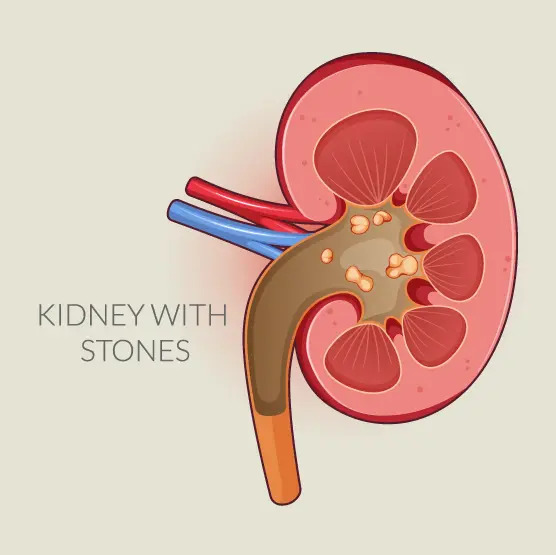
Cuttack
USFDA-Approved Procedures
Support in Insurance Claim
No-Cost EMI
1-day Hospitalization
Kidney stones form when there are excess salts and minerals in the kidneys. Kidneys are responsible for the removal of waste and fluid from the body through urine. When the concentration of waste is more than the fluid, the waste accumulates to form lumps which result in the formation of kidney stones. Kidney stones are not always painful and some patients can barely feel any pain or discomfort.
If the stones travel to the ureter, patients can suffer immense sudden pain in the lower back or even cause serious complications. Kidney stones can vary in size, they can be as small as a granule of sand to the size of a golf ball.


Treatment
Diagnosis
Kidney stones can usually be silent, which means they are asymptomatic. If your symptoms indicate kidney stones, the urologist may recommend you to undergo the following tests.
Procedure
There are different treatment options for kidney stones surgery which are as follows –
Delivering Seamless Kidney Stone Surgical Experience
We offer treatment through various non-invasive and minimally-invasive methods, including RIRS, ESWL, PCNL, etc., to ensure patients' comfort by reducing complications and downtime.
We are associated with the top hospitals in the city. This lets our doctors provide the best treatments for kidney stones using the most cutting-edge technology and ensure the best treatment outcomes. Our associated hospitals are well-equipped with all the facilities that the patients may need for a hassle-free treatment journey.
Our team consists of the best urologists in the city, who are highly trained in treating even the most complex cases of kidney stones. They have 8+ years of experience in providing effective diagnosis and treatment for kidney stones.
We accept all insurance for kidney stone treatment. We also have a dedicated insurance team to assist patients throughout the insurance claim procedure and make the process smooth for the patients.
If the size of the kidney stone is less than 10mm, your urologist will recommend medications that can flush it out through urine. But if the size of the stone is large or the number of stones is high, then surgery is required.
Kidney stones occur majorly due to the lack of fluids and the formation of excess salts. You can prevent kidney stones by following steps-
The estimated cost of different treatment options for kidney stone removal in Cuttack at Pristyn Care are:
These price ranges are not the same for every patient and are dependent on several factors.
Kidney stones are caused due to the following factors –
If the size of the stone is small, you can pass the stone at home by increasing your fluid intake or getting prescription medications from the doctor. You can consult your doctor for various home remedies for kidney stones removal. However, surgical methods are the most effective way to remove renal stones.
Pristyn Care provides advanced treatment for kidney stone surgery in Cuttack. We are equipped with the latest technology to ensure that every procedure is done with maximum precision. We have some of the best doctors on board that has had an excellent track record. If you undergo kidney stones surgery from Pristyn Care, you will get the following benefits-
Kidney stones may not always cause pain or discomfort if the size of the stone is very minuscule. But if the size of the stone is large, then medications will not help. Kidney stones can be treated with the help of advanced surgery that can either be incisional or non-incisional. Therefore, it is necessary to get your kidney stones treated to avoid any complications. The benefits of kidney stone surgery are-
Surgical or less invasive procedures are regarded as the most effective way to treat large kidney stones. Doctors usually recommend surgical procedures for kidney stones if the size of the stones is greater than 5mm. There are 4 procedures to remove kidney stones-
The patient is usually under the effects of anesthesia after the surgery and may suffer from mild dizziness and discomfort in case of stent insertion. Patients who have undergone invasive surgery may feel slight numbness around the site of the incision. Doctors at Pristyn Care guide you through the recovery period and monitor your health regularly to ensure you are in the best of your health. You may experience the following after your kidney stone surgeries –
Kidney stone is a major condition that usually results in unbearable pain. However, people are at greater risk if they ignore the symptoms by prolonging the treatment. It can lead to several complications that can eventually become life-threatening-
.svg)
.svg)
.svg)